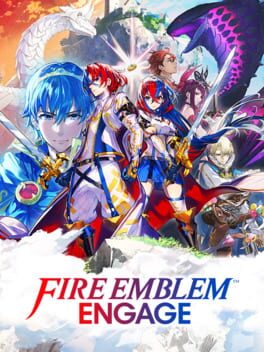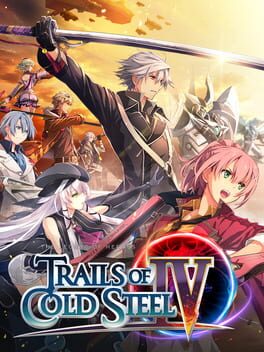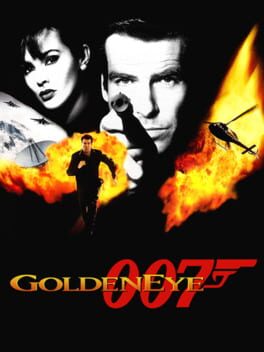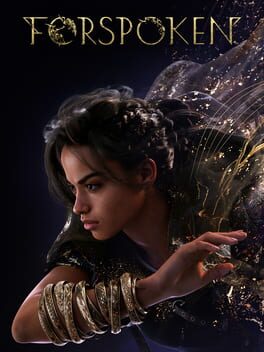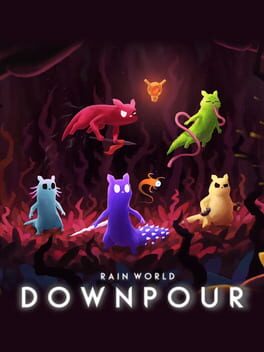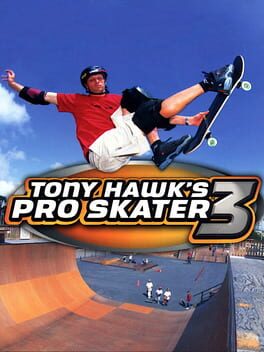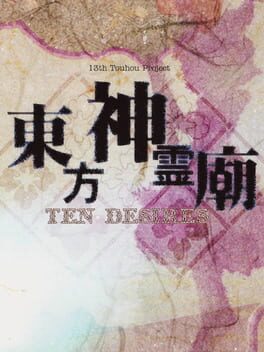Cakewalking
690 Reviews liked by Cakewalking
Fire Emblem Engage
2023
Hi-Fi Rush
2023
Hi-Fi Rush
2023
Playing Hi-Fi Rush feels like reading the first volume of a comic about a brand new superhero, unburdened by expectations.
There's such an obvious, whole-hearted commitment to creating a world that runs on music that I found myself bobbing my head and tapping my foot to literally nothing an hour after I put this one down. Rhythm is so thoroughly baked into this game's DNA that, after a certain point, it becomes more difficult to do things off beat than on it. It's got charm and earnestness that quiets my impulse to nitpick. Everything is music in some way, and every element snaps into place on a beat - UI elements, footsteps, enemy attacks, YOUR attacks, item pickups. Cohesive and confident enough that I would almost believe it if you told me it was somehow an influence on every rhythm genre hybrid that came before it. Feels like a game from 3 hardware generations ago, and I mean that in the best way possible.
There's such an obvious, whole-hearted commitment to creating a world that runs on music that I found myself bobbing my head and tapping my foot to literally nothing an hour after I put this one down. Rhythm is so thoroughly baked into this game's DNA that, after a certain point, it becomes more difficult to do things off beat than on it. It's got charm and earnestness that quiets my impulse to nitpick. Everything is music in some way, and every element snaps into place on a beat - UI elements, footsteps, enemy attacks, YOUR attacks, item pickups. Cohesive and confident enough that I would almost believe it if you told me it was somehow an influence on every rhythm genre hybrid that came before it. Feels like a game from 3 hardware generations ago, and I mean that in the best way possible.
GoldenEye 007
1997
Hi-Fi Rush
2023
From pause combos in Devil May Cry, to the parry sequences in Sekiro, rhythm has always been an integral part of action games. What hides this fact is that while the rhythm has always been there, it's typically unfocused. Bayonetta may be dancing to one beat, but the enemies are marching to one of their own, and the ost is going to an entirely different bpm. Action games have always been rhythm games, in the same way that the members of an orchestra all tuning their instruments disparately is still music.
This is what makes Hi-Fi Rush so brilliant. It realizes that the only missing piece keeping these games from being recognized as musical is a consistent beat. The player, enemies, music, stages, and cutscenes, everything is in sync.
It helps that the game is killer too, Chai's combos are slick and weave well into each other. The game has a strong set of enemies, and the partner mechanic is fun to play with. The animation is great, the levels are fun, and it has nearly all the features I look for in one of these games. (As far as I can tell, difficulty modes don't change enemy formations, that's pretty much my only disappointment)
It's just really rad ok? Go play it.
This is what makes Hi-Fi Rush so brilliant. It realizes that the only missing piece keeping these games from being recognized as musical is a consistent beat. The player, enemies, music, stages, and cutscenes, everything is in sync.
It helps that the game is killer too, Chai's combos are slick and weave well into each other. The game has a strong set of enemies, and the partner mechanic is fun to play with. The animation is great, the levels are fun, and it has nearly all the features I look for in one of these games. (As far as I can tell, difficulty modes don't change enemy formations, that's pretty much my only disappointment)
It's just really rad ok? Go play it.
Forspoken
2023
Rain World: Downpour
2023
Originally a collection of mods, Rain World: Downpour usually feels tonally closer to base game Hunter as you control superpowered slugcats in areas brimming with apex predators; the oppressive, gameplay-informed tone and intriguing, generally believable ecosystem are diminished here in favor of combat mechanics and big story beats, but in that regard, I think it largely succeeds. The new slugcats are fun to play and the new regions are frequently beautiful and awe-inspiring, rivaling and arguably surpassing the best set-pieces of the base game. There is an impressive amount of effort put into not only spriting the new regions but also remixing the old ones to portray different points in the timeline, creating a contrast between a lively past and a miserable future. The original Rain World was humbling in its implication of decay but in Downpour we get to see it happen ourselves, and it delivers a surprising amount of emotional heft.
You can tell that it used to be a mod sometimes, though. As interesting and fun as the new slugcats are, they are powerful and silly in a way that the original game would not have entertained, and this serves to mostly divorce the player from the base game’s feeling of being like a weak, unremarkable animal. The worst example of this mod-feeling and, in my opinion, the weakest aspect of the expansion is the new creatures: sparing a handful of exceptions, they are either syntheses of existing ones - generally executed in ways that feel cheesy(?) and jarring - or variations on existing ones - which are interesting, but not particularly innovative. Between this and the unrelenting spam of predators you have to deal with, it can be pretty hard to take the new content seriously as a supposed actual ecosystem (as opposed to just a deluge of video game enemies placed there for you to deal with) which is disappointing.
Downpour doesn’t quite feel like playing Rain World again, but that’s fine - I don’t think anything ever will. The original game is an utterly singular experience; its magical claustrophobia - the terror and beauty of fighting against all odds for dear life, crawling through the reclaimed pipes of ancient machines, their purposes and forms shimmering like mirages just beyond your capacity for understanding - would’ve never come to be if any of its constituent parts were changed at all. Every single bold gameplay decision, minimalist UI element, and example of art direction informs its ludo-narratively perfect, spiritual profoundness. But outside of the holistic, Rain World is also a game made out of incredibly good gamey parts: its combat is high stakes and fun - Downpour has more of that, better. Its lore is creative and fascinating, and its characters are lovable - Downpour has more of that, too. If you enjoy any of these aspects of the base game, Downpour will be worth your time and money. Despite being somewhat flawed in a few ways, Downpour is a commendable, impressive, and love-filled community-driven expansion that reveres the base game, and it deserves the positive attention the devs gave it. And even if you don’t like what it does, it's implemented in a way that leaves the original experience intact and default.
Rain World
2017
If one were to come up with a "golden rule" for making video games, I think the most commonly applicable mantra would be this:
Games should feel good to play, and they should be fair.
Hard to disagree with on the surface, and it's a rule that, in 99% of games, wouldn't steer you wrong. But assigning "rules" to art is tenuous at best. Filmmakers, musicians, writers, artists of all kind have long since learned the lesson that breaking conventions and established rules can be valuable in evoking certain emotions. Filmmakers have broken basic rules of shot composition to create a feeling of unease or intentional confusion, dissonance can have its value in music, and one may argue that traditional art may not have moved much past realism if not for artists pushing the boundaries of the medium to better present the intended emotion of a piece. Not every piece of art should be enjoyable to experience at all times, because life itself isn't always enjoyable to experience.
Rain World is a game which understands the value that can be created in not being enjoyable. Rain World is unfair, not because the developers didn't balance the game correctly, but because they understood that as soon as they started making concessions for the player, the ecosystem they created would cease to feel believable, and the world would become the same as nearly every other game; a space made for the player, in service of an enjoyable experience. If enemies arbitrarily ceased attacking you as you changed screens or adhered to specific patrols and behaviors they would no longer feel like inhabitants of this world, but instead merely obstacles meant to be overcome.
To be totally fair to Rain World’s detractors, there are two stances one could take in opposition to this unfairness that I see as valid concerns:
1. Players with any sort of accessibility concerns may be completely incapable of completing Rain World due to its indifferent approach to fairness - I sympathize heavily with anyone who simply cannot complete Rain World due to conditions out of their control. The game added the Monk character which goes a decent way towards making the experience easier for players, but this "easy mode" character doesn't fundamentally change the way the world works, it just makes those moments of unfairness less frequent.
2. Related to my previous point, video games are the only medium which are largely active experiences. You may find an aspect of a film upsetting in some form, but you can take solace in the fact that so long as you don't shut it off or walk out of the theatre you will see the ending to the movie, you don't need any sort of active input to see the credits roll. This isn't a promise kept for video games because many of them require some direct input from the player to reach the ending, so therefore some consideration should be made to allowing the player to reach the ending of a game. I don't think that buying a game somehow entitles you to experience it in full without trying, but I also understand the idea that at the very least, the obstacles presented to the player should be ones they can overcome with their own skill, rather than left to the whims of an unfair system.
As a side note, Rain World may not seem to be very fair, but at the very least it has two concessions made in the players favor; that you can respawn at all flies in the face of the idea behind making a believable ecosystem but I think we can all agree that it’s a necessary concession, and that you can see when enemies are coming through pipes in advance to avoid getting killed by something you had zero chance of seeing.
Yet barring those small concessions, Rain World is indifferent to your plights, and because of this, it approaches a level of realism that beats out the almost lifelike graphics and shallow survival systems of triple A games. Navigating this world is truly treacherous and yet, because of this, it creates some of the most satisfying moments I’ve experienced in a game, none of which are scripted. Escaping the jaws of a salamander through a well-placed spear to its face, out-swimming a massive sea monster, befriending a group of scavengers and helping them fight off a dangerous vulture are all satisfying and memorable because you know that the game didn’t lean in your favor in the slightest, you accomplished these things by yourself using your knowledge, survival skills and wit.
It also helps immensely that the music is appropriately foreboding and suits the drop-dead GORGEOUS art of the game. Seriously, Rain World is probably the best looking 2D game I’ve ever played, all the realism in its mechanics would have been utterly wasted if the art hadn’t been up to snuff but thankfully, it compliments the gameplay perfectly. I also want to give a small shoutout to the ending sequence which, without spoilers, left me in a state of complete awe and was the perfect capstone to the experience.
I can completely understand why many find this game frustrating, but to me it’s proof that this medium has so much room to grow and expand. Gaming is a very new form of art, so seeing indie games like Rain World be willing to push the boundaries of the medium gives me hope that maybe the art form isn’t as doomed to homogenization as I thought. As usual, the indies continue to push art forward, while the big companies are content with stagnation.
Games should feel good to play, and they should be fair.
Hard to disagree with on the surface, and it's a rule that, in 99% of games, wouldn't steer you wrong. But assigning "rules" to art is tenuous at best. Filmmakers, musicians, writers, artists of all kind have long since learned the lesson that breaking conventions and established rules can be valuable in evoking certain emotions. Filmmakers have broken basic rules of shot composition to create a feeling of unease or intentional confusion, dissonance can have its value in music, and one may argue that traditional art may not have moved much past realism if not for artists pushing the boundaries of the medium to better present the intended emotion of a piece. Not every piece of art should be enjoyable to experience at all times, because life itself isn't always enjoyable to experience.
Rain World is a game which understands the value that can be created in not being enjoyable. Rain World is unfair, not because the developers didn't balance the game correctly, but because they understood that as soon as they started making concessions for the player, the ecosystem they created would cease to feel believable, and the world would become the same as nearly every other game; a space made for the player, in service of an enjoyable experience. If enemies arbitrarily ceased attacking you as you changed screens or adhered to specific patrols and behaviors they would no longer feel like inhabitants of this world, but instead merely obstacles meant to be overcome.
To be totally fair to Rain World’s detractors, there are two stances one could take in opposition to this unfairness that I see as valid concerns:
1. Players with any sort of accessibility concerns may be completely incapable of completing Rain World due to its indifferent approach to fairness - I sympathize heavily with anyone who simply cannot complete Rain World due to conditions out of their control. The game added the Monk character which goes a decent way towards making the experience easier for players, but this "easy mode" character doesn't fundamentally change the way the world works, it just makes those moments of unfairness less frequent.
2. Related to my previous point, video games are the only medium which are largely active experiences. You may find an aspect of a film upsetting in some form, but you can take solace in the fact that so long as you don't shut it off or walk out of the theatre you will see the ending to the movie, you don't need any sort of active input to see the credits roll. This isn't a promise kept for video games because many of them require some direct input from the player to reach the ending, so therefore some consideration should be made to allowing the player to reach the ending of a game. I don't think that buying a game somehow entitles you to experience it in full without trying, but I also understand the idea that at the very least, the obstacles presented to the player should be ones they can overcome with their own skill, rather than left to the whims of an unfair system.
As a side note, Rain World may not seem to be very fair, but at the very least it has two concessions made in the players favor; that you can respawn at all flies in the face of the idea behind making a believable ecosystem but I think we can all agree that it’s a necessary concession, and that you can see when enemies are coming through pipes in advance to avoid getting killed by something you had zero chance of seeing.
Yet barring those small concessions, Rain World is indifferent to your plights, and because of this, it approaches a level of realism that beats out the almost lifelike graphics and shallow survival systems of triple A games. Navigating this world is truly treacherous and yet, because of this, it creates some of the most satisfying moments I’ve experienced in a game, none of which are scripted. Escaping the jaws of a salamander through a well-placed spear to its face, out-swimming a massive sea monster, befriending a group of scavengers and helping them fight off a dangerous vulture are all satisfying and memorable because you know that the game didn’t lean in your favor in the slightest, you accomplished these things by yourself using your knowledge, survival skills and wit.
It also helps immensely that the music is appropriately foreboding and suits the drop-dead GORGEOUS art of the game. Seriously, Rain World is probably the best looking 2D game I’ve ever played, all the realism in its mechanics would have been utterly wasted if the art hadn’t been up to snuff but thankfully, it compliments the gameplay perfectly. I also want to give a small shoutout to the ending sequence which, without spoilers, left me in a state of complete awe and was the perfect capstone to the experience.
I can completely understand why many find this game frustrating, but to me it’s proof that this medium has so much room to grow and expand. Gaming is a very new form of art, so seeing indie games like Rain World be willing to push the boundaries of the medium gives me hope that maybe the art form isn’t as doomed to homogenization as I thought. As usual, the indies continue to push art forward, while the big companies are content with stagnation.
Fire Emblem Engage
2023
Fire Emblem Engage
2023
Intelligent systems, is this a bit?
As soon as it was announced Engage is a game that was raising a bunch of red flags. Nostalgia baiting, the awful focus on a myunit, gimmicky new mechanics and fucking GACHA? The whole thing really looked like intelligent systems giving into the worst tendancies of post-awakening Fire Emblem.
And y'know, if that was it, i'd probably be at least fine with that. Fates, even revelations, one of the dumbest fucking things i've ever played, are all still at the very least, compelling. I have like 100 hours in Fates, embarassing as that is, because the Fire Emblem formula is still pretty great, conquest has like 5 good maps and the bad stuff is mostly ignorable. I have played fucking Gaiden to completion even after Echoes was out just to see what was up.
With engage ive got 15 hours in it and I can barely stomach a moment more. I want to keep going because I love FE. But I absolutely cannot stand this game.
Yes, like Fates, Engage is a game that falls prey to IS' stupid tendancies. But the real sin with Engage is that what has been cribbed about just does not gel together at all.
Main issue is bloat, on a gameplay level. Part of the genius of Fire Emblem is how really quite simple it all is, and how limited the resources and options really all are. The best section of the entire franchise, and it's not even close, is Thracia 776's Munster arc, a section which truly relies on you making the most of an incredibly limited toolset and pushing it as far as you can against overwhelming odds. Of course, over the years the complexity inevitably increased, to mixed but often positive results. Engage firmly goes too far though.
The big problem is the mixing of the social sim stuff from 3 houses whilst also incorporating its new stuff with the engage system and so on. Being able to boost stats and stuff in a hub was questionable but mosty worked in 3H, a game structured around it. In Engage all the stat boosting, friendship boosting, animal handling(why), minigames (WHY) are mindnumbing roadblocks to the fun strategy. These sorts of things have never really sat right in FE, where the ways damage formulas and speed formulas in particular work make tiny stat boosts often have huge implications, but this goes way too far in a game system very unsuited to it. It essentially stretches the preperations stage, already too long in most FEs, to being the majority of the game. It's unnaceptable.
And it's a real shame as a lot of the changes in the gameplay department are actually really good. Map design is probably the best it's been since radiant dawn, unit balance doesnt seem so overfocused on a small amount of strong units, bosses actually move about and honestly the engage system, regardless of it being insulting to the original characters and whatever, is a pretty neat gimmick honestly. It's a way more balanced version of pair up that gives effectively more burst damage and interesting techniques, which combined with enemies being generally stronger than previous games makes for an interesing loop. Obviously, its in this game so the execution is flubbed - the rings being limited in number kinda undoes the balance improvements on its own, and the skill inheritance, bonding, and gacha ring stuff is yet more pointless fluff to waste your damn time.
If the game just had the engage system over lets say, Radiance series levels of prep and other stuff going on, the gameplay could have been great, probably the best the series had seen in over a decade. But there's way too much going on to waste your time and it does not gel together.
The story and characters are so bafflingly bad I don't know who it's even for. As ludicrously bad as fates' are, at least it's very easy to pinpoint what's going for - the sheer power trip of being infalliable corrin, the stupid golden route both sides-ing and being able to have children with your big booba wyvern riding sister. Engage's is less bad in the "IS is down bad" regard, but it's worse in that it just completely forgets to have anything at all. It's completely hookless, the world and characters feel like they've got nothing going on at all, and it all feels very rote. The mystical/dragon elements feel tappen onto a pretty normal fire emblem plot and all they do is make the MC less personable and relatable. FE has only really had a good story in like 4 games, but it's structure as a series has always made it very easy to connect to characters and it has never dropped the ball this hard, and it's not like it's even trying something.
The whole game is just a confused mess, and doesnt even seem to be sure of who it's appeal is for. It's nostalgia bait to an extreme whilst barely resembling the simple, down to earth nature of those games. It goes for a simpler structure, dropping choice and most of the social sim elements (which people quite liked even if they're not entirely my bag), but keeps just enough of them to be really annoying. Characters are less of a focus for some reason? Romance is less of a thing? I can't even tell who this game is for because it feels like it consciously does something to alienate a fan of every game in the series, and it certaintly isnt for new players. Even as a "we needed 20 more characters to eventually put in heroes" joint it's a complete failure.
I hesitate to say this is the worst FE - Revelations is truly awful - but even Fates had like, an idea of what it was going for, as bad as what that is and as bad as it's execution is. Engage is aimless and awful and for the first time ever, it's easy for me to put an FE down.
As soon as it was announced Engage is a game that was raising a bunch of red flags. Nostalgia baiting, the awful focus on a myunit, gimmicky new mechanics and fucking GACHA? The whole thing really looked like intelligent systems giving into the worst tendancies of post-awakening Fire Emblem.
And y'know, if that was it, i'd probably be at least fine with that. Fates, even revelations, one of the dumbest fucking things i've ever played, are all still at the very least, compelling. I have like 100 hours in Fates, embarassing as that is, because the Fire Emblem formula is still pretty great, conquest has like 5 good maps and the bad stuff is mostly ignorable. I have played fucking Gaiden to completion even after Echoes was out just to see what was up.
With engage ive got 15 hours in it and I can barely stomach a moment more. I want to keep going because I love FE. But I absolutely cannot stand this game.
Yes, like Fates, Engage is a game that falls prey to IS' stupid tendancies. But the real sin with Engage is that what has been cribbed about just does not gel together at all.
Main issue is bloat, on a gameplay level. Part of the genius of Fire Emblem is how really quite simple it all is, and how limited the resources and options really all are. The best section of the entire franchise, and it's not even close, is Thracia 776's Munster arc, a section which truly relies on you making the most of an incredibly limited toolset and pushing it as far as you can against overwhelming odds. Of course, over the years the complexity inevitably increased, to mixed but often positive results. Engage firmly goes too far though.
The big problem is the mixing of the social sim stuff from 3 houses whilst also incorporating its new stuff with the engage system and so on. Being able to boost stats and stuff in a hub was questionable but mosty worked in 3H, a game structured around it. In Engage all the stat boosting, friendship boosting, animal handling(why), minigames (WHY) are mindnumbing roadblocks to the fun strategy. These sorts of things have never really sat right in FE, where the ways damage formulas and speed formulas in particular work make tiny stat boosts often have huge implications, but this goes way too far in a game system very unsuited to it. It essentially stretches the preperations stage, already too long in most FEs, to being the majority of the game. It's unnaceptable.
And it's a real shame as a lot of the changes in the gameplay department are actually really good. Map design is probably the best it's been since radiant dawn, unit balance doesnt seem so overfocused on a small amount of strong units, bosses actually move about and honestly the engage system, regardless of it being insulting to the original characters and whatever, is a pretty neat gimmick honestly. It's a way more balanced version of pair up that gives effectively more burst damage and interesting techniques, which combined with enemies being generally stronger than previous games makes for an interesing loop. Obviously, its in this game so the execution is flubbed - the rings being limited in number kinda undoes the balance improvements on its own, and the skill inheritance, bonding, and gacha ring stuff is yet more pointless fluff to waste your damn time.
If the game just had the engage system over lets say, Radiance series levels of prep and other stuff going on, the gameplay could have been great, probably the best the series had seen in over a decade. But there's way too much going on to waste your time and it does not gel together.
The story and characters are so bafflingly bad I don't know who it's even for. As ludicrously bad as fates' are, at least it's very easy to pinpoint what's going for - the sheer power trip of being infalliable corrin, the stupid golden route both sides-ing and being able to have children with your big booba wyvern riding sister. Engage's is less bad in the "IS is down bad" regard, but it's worse in that it just completely forgets to have anything at all. It's completely hookless, the world and characters feel like they've got nothing going on at all, and it all feels very rote. The mystical/dragon elements feel tappen onto a pretty normal fire emblem plot and all they do is make the MC less personable and relatable. FE has only really had a good story in like 4 games, but it's structure as a series has always made it very easy to connect to characters and it has never dropped the ball this hard, and it's not like it's even trying something.
The whole game is just a confused mess, and doesnt even seem to be sure of who it's appeal is for. It's nostalgia bait to an extreme whilst barely resembling the simple, down to earth nature of those games. It goes for a simpler structure, dropping choice and most of the social sim elements (which people quite liked even if they're not entirely my bag), but keeps just enough of them to be really annoying. Characters are less of a focus for some reason? Romance is less of a thing? I can't even tell who this game is for because it feels like it consciously does something to alienate a fan of every game in the series, and it certaintly isnt for new players. Even as a "we needed 20 more characters to eventually put in heroes" joint it's a complete failure.
I hesitate to say this is the worst FE - Revelations is truly awful - but even Fates had like, an idea of what it was going for, as bad as what that is and as bad as it's execution is. Engage is aimless and awful and for the first time ever, it's easy for me to put an FE down.
When your wheels touched concrete in the summer of 1999, you were sure nothing would ever compare to this. Propelled downhill, less by gravity but more by the venerated asphalt spirit, skaters far and wide convened here, a jam to end all jams. While you were happy doing everything you could, holding on to what you were, you couldn’t help but stare skyward at the street zephyrs soaring suspended; They careened through the air, making waxed wood and molded metal both their playthings. As you crashed down to the soul-shattering gravel, face bloodied and back broken, you could only wonder how they ascended from simple skaterdom, piercing the heavens of the board.
It took a year of shattered bones and busted lines to reclaim those halcyon days. A year of spilt blood and scattered teeth, splintered wood and worn polyurethane. It all felt like a dream then, placing bronze out in Roswell, but the age of simple skating had come and gone. You perfected flatland balance, dual-wheel worship at the altar of Mullen, but even perfection wasn’t enough for elusive gold; the Bullring by the Sea didn’t just cost you your metal, it cost you years of knowing you weren't good enough.
So now we’re here. Somehow, another year felt like two decade’s separation; Gone was the California sun, the first to die in the American Wasteland. A nation of Sparrows and Jackasses, failed projects and unproven theories, crept under wheel, biting at the ankles of the past. The spirit of yesterday was buried underground, leaving today to mourn in remembrance.
Well, maybe for some. The only angels you prayed to struck gold, immortalized in sharp vertexes and warped textures. They would be memorialized not in the world’s destruction, but in a final tour, eight stops; a send-off of olden days.
You forged your craft, refining your spark-casting perfection on the rails of automation, before skating to the north. Calgary’s frost-bitten hospitality was the first real test, but as if guided by Hawk’s holy hand, the snowy providence of Alberta bowed down, hailing 900s and McTwists like the second coming. For the first time in decades, a smile spreads across your face, your cheeks still rosy-red from the icy air…
You blink, and awaken to a crowd cheering your name. Looking down on the masses, faces revered and reviled stare back; Muska, Campbell, Reynolds and Margera. You glance around for Burnquist, hoping to celebrate with the hometown hero, but the master is missing in action. Somehow, you were sure you’d be able to show off this gold to him somewhere down the line.
It repeats, on and on: Suburbia becomes New Jersey, the Airport becomes a Mall. Twenty years made it all blend together. Even now, your second gold medal in hand, it barely feels like you’re awake. When those wheels roll, maple boards of a bygone age, time disappears, rendered in heelflips and darkslides. The pomp and circumstance of it all becomes an excuse, more than anything. In your immortalized element, the past is as real as you remember it.
The final jam beckons; neo-chrome Tokyo glistens, welcoming only the best of the best. The competition rages on, dreams dashed in fractured bones and dislocations. No matter what you do, face-to-face with your idols, no, your contemporaries, there's no break, no chance to cover lost ground. Rivals dwindle as career-ending injuries take one after another, but the legendary Birdman flies past.
Seconds are left in the last heat; only a miracle will change the course of destiny. You think to the future, to the final 900 and the first 1260. As if coming free from its wheels, the board possesses you one last time, as you pivot hard on impact, momentum propelling you into the cosmos.
180. 360. 540.
Tony looks skyward, the same shine that was in your eyes twenty years prior.
Two rotations. The 900. 1080.
Nothing else matters. An amoeba with a mind of its own, an ace of spades, whatever you were and where you come from don't matter. This lone moment, spinning on a golden axis, is what it all comes down to.
Zero seconds. You don't bother looking at the scoreboard; you knew better than to think that's what this is about.
All you were looking for was this lone moment of perfection, a revision of the summer of '99. You wrap your hand tight around your medal - does it even matter what it is? - as you board the plane back to California. Staring out the window, you see the past and future together, a first-hand account of what it's like when worlds collide. You never forget the past, and tomorrow closes in fast, but this single moment is eternal.
All the grand gestures can't ease your wonder. You finally unwrap the medal and take it in.
100% Pure Gold.
It took a year of shattered bones and busted lines to reclaim those halcyon days. A year of spilt blood and scattered teeth, splintered wood and worn polyurethane. It all felt like a dream then, placing bronze out in Roswell, but the age of simple skating had come and gone. You perfected flatland balance, dual-wheel worship at the altar of Mullen, but even perfection wasn’t enough for elusive gold; the Bullring by the Sea didn’t just cost you your metal, it cost you years of knowing you weren't good enough.
So now we’re here. Somehow, another year felt like two decade’s separation; Gone was the California sun, the first to die in the American Wasteland. A nation of Sparrows and Jackasses, failed projects and unproven theories, crept under wheel, biting at the ankles of the past. The spirit of yesterday was buried underground, leaving today to mourn in remembrance.
Well, maybe for some. The only angels you prayed to struck gold, immortalized in sharp vertexes and warped textures. They would be memorialized not in the world’s destruction, but in a final tour, eight stops; a send-off of olden days.
You forged your craft, refining your spark-casting perfection on the rails of automation, before skating to the north. Calgary’s frost-bitten hospitality was the first real test, but as if guided by Hawk’s holy hand, the snowy providence of Alberta bowed down, hailing 900s and McTwists like the second coming. For the first time in decades, a smile spreads across your face, your cheeks still rosy-red from the icy air…
You blink, and awaken to a crowd cheering your name. Looking down on the masses, faces revered and reviled stare back; Muska, Campbell, Reynolds and Margera. You glance around for Burnquist, hoping to celebrate with the hometown hero, but the master is missing in action. Somehow, you were sure you’d be able to show off this gold to him somewhere down the line.
It repeats, on and on: Suburbia becomes New Jersey, the Airport becomes a Mall. Twenty years made it all blend together. Even now, your second gold medal in hand, it barely feels like you’re awake. When those wheels roll, maple boards of a bygone age, time disappears, rendered in heelflips and darkslides. The pomp and circumstance of it all becomes an excuse, more than anything. In your immortalized element, the past is as real as you remember it.
The final jam beckons; neo-chrome Tokyo glistens, welcoming only the best of the best. The competition rages on, dreams dashed in fractured bones and dislocations. No matter what you do, face-to-face with your idols, no, your contemporaries, there's no break, no chance to cover lost ground. Rivals dwindle as career-ending injuries take one after another, but the legendary Birdman flies past.
Seconds are left in the last heat; only a miracle will change the course of destiny. You think to the future, to the final 900 and the first 1260. As if coming free from its wheels, the board possesses you one last time, as you pivot hard on impact, momentum propelling you into the cosmos.
180. 360. 540.
Tony looks skyward, the same shine that was in your eyes twenty years prior.
Two rotations. The 900. 1080.
Nothing else matters. An amoeba with a mind of its own, an ace of spades, whatever you were and where you come from don't matter. This lone moment, spinning on a golden axis, is what it all comes down to.
Zero seconds. You don't bother looking at the scoreboard; you knew better than to think that's what this is about.
All you were looking for was this lone moment of perfection, a revision of the summer of '99. You wrap your hand tight around your medal - does it even matter what it is? - as you board the plane back to California. Staring out the window, you see the past and future together, a first-hand account of what it's like when worlds collide. You never forget the past, and tomorrow closes in fast, but this single moment is eternal.
All the grand gestures can't ease your wonder. You finally unwrap the medal and take it in.
100% Pure Gold.
Touhou macro-level plots are generally at their best when they're just weird meditations on things instead of actually attempting to have stakes, and Ten Desires is definitely one of those. The whole thing is mostly a setup for the next fighting game, setting up a Taoist faction in the setting and the idea that they might want a full scale religious war with the Buddhists from UFO.
Touhou was always about myths, folklore, and their place in the modern world, but Ten Desires specifically looks at historical figures by having the antagonist be Prince Shotoku, a very well-known figure, and then having him actually be completely different from the legends in ways that maybe accidentally feel like wild conspiracy theories. Secretly Taoist. Secretly in league with her enemies. Secretly an anime lady with headphones and not the mustached guy on the currency.
Frankly, as a North American colonizer, all the closest legendary historical figures are extremely recent, so there's less of the whole "might not have actually existed" going on, but you don't have to look far to find the mythologizing of real people. How many shitty copy paste stories about Albert Einstein owning liberal teachers have you seen? I love what Miko adds to the flavor of the Touhou setting and I love her stupid hair.
Oh yeah the game? The shooting? It's a really easy one designed for new people to have an easy time getting into it. The special mechanic isn't super exciting but it can be kind of fun to power up and shoot a bunch of bullets. I like this one.
Touhou was always about myths, folklore, and their place in the modern world, but Ten Desires specifically looks at historical figures by having the antagonist be Prince Shotoku, a very well-known figure, and then having him actually be completely different from the legends in ways that maybe accidentally feel like wild conspiracy theories. Secretly Taoist. Secretly in league with her enemies. Secretly an anime lady with headphones and not the mustached guy on the currency.
Frankly, as a North American colonizer, all the closest legendary historical figures are extremely recent, so there's less of the whole "might not have actually existed" going on, but you don't have to look far to find the mythologizing of real people. How many shitty copy paste stories about Albert Einstein owning liberal teachers have you seen? I love what Miko adds to the flavor of the Touhou setting and I love her stupid hair.
Oh yeah the game? The shooting? It's a really easy one designed for new people to have an easy time getting into it. The special mechanic isn't super exciting but it can be kind of fun to power up and shoot a bunch of bullets. I like this one.
Marvel's Spider-Man
2018
This is just a generic ass open world game with spider-man, the combat is pretty good and the story is also pretty good but the stealth is genuienly terrible and the segents where you play as anybody except for spider-man are also terrible espcially the puzzles that you can just skip. And perhaps the most praised part of the game being the web slinging is to me pretty fun at first but then becomes mind numbing since its pretty much all automated making for just brain dead expirence where you win so matter what instead of having to actually get better at the mechanic. But in the end the story is decent and so is the combat and the game looks fantastic but the soundtrack sucks the varitey in gameplay also sucks and the open world objectives are boring ubisoft styled collectables that just aren't fun at all.
